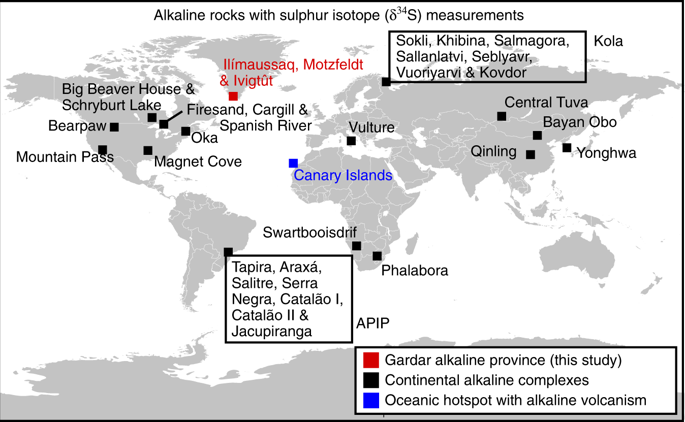Nature Communications ( IF 14.7 ) Pub Date : 2019-09-16 , DOI: 10.1038/s41467-019-12218-1 William Hutchison 1 , Rainer J Babiel 2 , Adrian A Finch 1 , Michael A W Marks 2 , Gregor Markl 2 , Adrian J Boyce 3 , Eva E Stüeken 1 , Henrik Friis 4 , Anouk M Borst 1 , Nicola J Horsburgh 1

|
Earth’s surface and mantle sulphur reservoirs are connected via subduction, crustal recycling and volcanism. Although oceanic hotspot lavas currently provide the best constraints on the deep sulphur cycle, their restricted age range (<200 Ma) means they cannot reveal temporal variations in crustal recycling over Earth history. Sulphur-rich alkaline magmas offer the solution because they are associated with recycled sources (i.e. metasomatized lithospheric mantle and plumes) and, crucially, are found throughout the geological record. Here, we present a detailed study of sulphur isotope fractionation in a Mesoproterozoic alkaline province in Greenland and demonstrate that an enriched subduction-influenced source (δ34S of +1 to +5‰) can be reconstructed. A global δ34S compilation reveals secular variation in alkaline magma sources which support changes in the composition of the lithospheric mantle and/or Ga timescales for deep crustal recycling. Thus, alkaline magmas represent a powerful yet underutilized repository for interrogating crustal recycling through geological time.
中文翻译:

碱性岩浆的硫同位素揭示了地球上地壳再循环的长期记录。
地表硫和地幔硫的储集层通过俯冲,地壳循环利用和火山作用相互连接。尽管目前海洋热点熔岩对深部硫循环提供了最好的约束,但其受限制的年龄范围(<200 Ma)意味着它们无法揭示地球历史上地壳再循环的时间变化。富含硫的碱性岩浆提供了解决方案,因为它们与循环利用的资源(即交代的岩石圈地幔和羽状流)相关联,并且至关重要的是,在整个地质记录中都可以找到它们。这里,我们提出硫同位素分馏的详细研究在格陵兰中元碱性省并证明富集俯冲影响源(δ 34的1至5小号‰)可以被重建。全局δ 34S汇编揭示了碱性岩浆源的长期变化,这些变化支持岩石圈地幔成分和/或Ga时标的变化,以进行深地壳的再循环。因此,碱性岩浆代表了一个功能强大但未被充分利用的储藏库,用于通过地质时间询问地壳的再循环。































 京公网安备 11010802027423号
京公网安备 11010802027423号